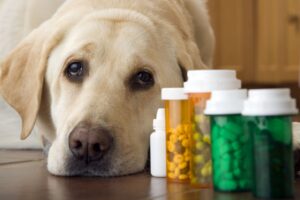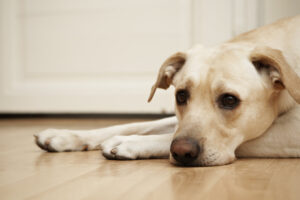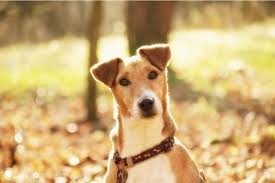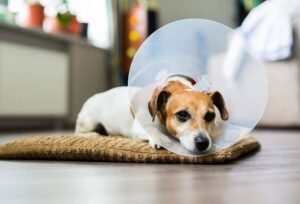
Neutering is a recommended for pets and offers several benefits. It eliminates the possibility of a surprise litter of puppies and lessens the chance of your dog getting testicular cancer or developing prostate disease. On the other hand, there are temporary downsides. If you recently neutered your dog, you may wonder, “why is my dog sad after neutering?”
Some reasons dogs feel depressed after surgery is from the hormonal changes, stress, and residual pain. Below, we’ll fully discuss why your dog may feel sad after neutering and what to do for them.
Before you scroll down this guide, “Why Is My Dog Sad After Neutering,” check out: Why Is My Dog Peeing So Much After Being Spayed or Neutered? (2023).
Why Is My Dog Sad After Neutering?

Sadness or depression is one of the side effects a dog may experience after neutering. Here are some of the potential reasons.
Hormonal Imbalance
Hormones can affect the mood of humans and dogs, so surgical procedures that disrupt hormone levels often lead to depression. Spaying and neutering are the surgeries most likely to cause sadness due to removing reproductive organs.
Because reproductive organs play a significant role in hormone balance, their removal may cause a few behavioral side effects. Some dogs may seem sad, while others are more aggressive.
Thankfully, these hormone changes are temporary; your dog’s depression will subside after its hormones return to normal.
Reactions to Medications

Dogs undergo anesthesia and are given pain meds to manage the discomfort after the surgery. These medications may cause your dog to feel lethargic and cause them to be less active than usual.
Your dog may perk up after the recovery period. Although the medications may cause a few side effects, it’s crucial to keep giving them to help manage the pain.
Discomfort
Although the medication your veterinarian prescribes will help with the pain, your dog will likely experience discomfort throughout the healing process.
You may have a cone on your dog to keep it from licking surgical wounds, which can be somewhat frustrating for them. Not to mention, your puppy is dealing with the itchiness and discomfort of the wounds themselves.
Until the discomfort subsides, your dog may feel a bit gloomy.
What to Expect Post-Surgery

Preparing for your dog’s surgery and caring for them afterward may be confusing. Knowing what will happen ahead of time can keep you from feeling disorganized. Here is what to expect after neutering your dog.
Neutering Shouldn’t Take Long
The neutering procedure takes less than 20 minutes, depending on your dog’s size and age. So, don’t schedule the surgery on a busy day; you’ll want to be able to get them once the procedure is over.
In most cases, you’ll be able to bring your dog home on the same day. At the most, you may need to wait until the next day if the neutering is scheduled later in the day.
Behavioral Changes

Your dog may display a few behavioral changes after neutering. They may feel depressed, anxious, or more aggressive than usual.
The changes are regular and should return to normal after the recovery period. However, contact the veterinarian if you notice the changes lasting weeks or months after recovery.
Vomiting
Your dog may vomit after eating its full meal post-surgery. Although they may be hungry or thirsty, avoid giving them food and water until the anesthesia wears off to limit the chance of vomiting. Once your dog is less wobbly, start with a small meal.
Dogs may also throw up post-surgery because they eat or drink too fast. Dogs cannot eat or drink water before the surgery, so they’ll likely have a big appetite once they finally get home.
If vomiting or any other issues persist, contact the veterinarian.
Decreased Defecation

Your dog may not poop as often after the procedure, and some dogs don’t defecate at all. It’s common for dogs who’ve recently had the surgery, so don’t be worried if you notice this habit change.
It may take two to three days before your dog has a complete bowel movement. If they don’t defecate for more than three days, something may be wrong.
How to Make Your Dog Feel Better After Neutering

Your dog will need extra help post-surgery. Here are the best methods to care for it during recovery.
Prepare a Rest Area
Your puppy will need a lot of rest and sleep after its neuter surgery. Ensure there is a comfortable area for them to rest and recover.
If your dog sleeps in a dog bed, clean it and place it in the spot where they spend a lot of time. Keep fresh water and its food in the rest area. You want your dog to be able to eat and drink without needing too much extra effort.
Spend Time With Your Dog

Your dog may need more attention after the procedure. Keep their rest area near you, or create another small rest area nearby. After being with strangers for a few hours or days, your puppy will enjoy spending time with their favorite people.
Give Your Puppy a Back Rub
Is there anything better than a back scratch or a massage when you’re feeling down? Gently brush your dog’s fur with a soft brush or offer a few extra back rubs. Only do these activities if it’s something they typically enjoy.
Limit Physical Activity

Although dogs require daily exercise, they can take a little break after the surgery. Don’t push your dog to run or play while recovering.
Your dog will be in recovery for about 10 to 14 days while its body works through the healing process. Do what you can to ensure your puppy gets plenty of rest.
Give Your Dog Any Prescribed Medication
The vet will give you medication to help manage your puppy’s pain. After the surgery, you’ll need to ensure your dog takes medicine regularly. Follow the instructions given by your vet.
How Long Does It Take a Dog to Feel Better After Being Neutered?

If your dog feels sad or depressed after neutering, it should feel better within a few days to a couple of weeks. The length of time it takes for the behavioral changes to return to normal depends on the cause.
Dogs that were stressed because of the surgery may feel better within 24 hours. On the other hand, if your dog is depressed because of the discomfort or medication, it may take longer.
Allow your dog to recover and heal for 10 to 14 days and take note of its behaviors. If the strange behavior persists after this time frame, contact your veterinarian.
Frequently Asked Questions

Here are the most frequently asked questions regarding why your dog is sad after neutering.
Every dog will respond to and recover from surgery at a different rate. On average, dogs will feel better and behave normally after a few days or weeks. There are several factors that may affect your dog’s sadness, like its mental state prior to surgery, age, and medication.
Yes, it is normal for dogs to be sad or even depressed after surgery. Many pain medications have depression or lethargy as a side effect. Your dog will need a lot of rest for a couple of weeks after the procedure, but your puppy will slowly feel better as they heal.
Some neutered dogs may act normally after the surgery, while others may experience behavioral issues. Your dog will feel discomfort after the procedure and will spend most of its time resting for a couple of weeks. The weirdness is temporary, and your dog should act normally within a few weeks.
The best way to cheer up your dog after surgery is to provide a quiet, comfortable resting area. Keep young children and pets away from during the recovery period. Give your puppy plenty of room to spread out and stay comfy. Try to eliminate loud noises or other stimuli, so your dog feels safe.
Some dogs may feel a little uncoordinated or nauseous for a day or so after surgery. Typically, anesthesia will wear off within 48 hours. Your dog will also be lethargic during this time. Once the anesthesia wears off, they may continue to be low-energy or drowsy from their medications.
Conclusion for “Why Is My Dog Sad After Neutering”
Neutering is a standard procedure to prevent your dog from impregnating another dog. During this procedure, your dog’s reproductive organ is removed, which can affect its hormones. The hormonal imbalance may cause sadness, depression, aggression, or anxiety.
While your puppy heals, it will be uncomfortable, lethargic, and need plenty of rest. So, several factors may contribute to your dog’s behavior and mood. Allow them to keep it easy for a few weeks and create a restful environment.
Your dog will likely be back to its lively self within a few weeks after recovery.
If you find this guide, “Why Is My Dog Sad After Neutering,” helpful, check out:
Learn more by watching “Caring for Your Dog After Neutering Them? | 5 Tips – Veterinarian approved” down below:
Garrett loves animals and is a huge advocate for all Doodle dog breeds. He owns his own Goldendoodle named Kona. In addition, he volunteers at the Humane Society of Silicon Valley, where he fosters dogs and helps animals. Garrett enjoys writing about Doodles and believes that dogs can teach humans more about how to live than humans can teach a dog.
Why Trust We Love Doodles?
At We Love Doodles, we’re a team of writers, veterinarians, and puppy trainers that love dogs. Our team of qualified experts researches and provides reliable information on a wide range of dog topics. Our reviews are based on customer feedback, hands-on testing, and in-depth analysis. We are fully transparent and honest to our community of dog owners and future owners.
